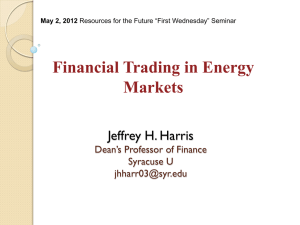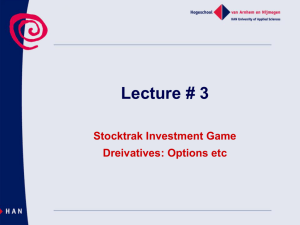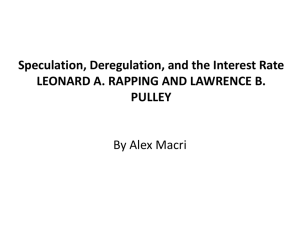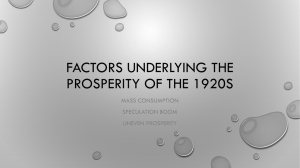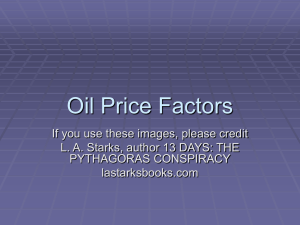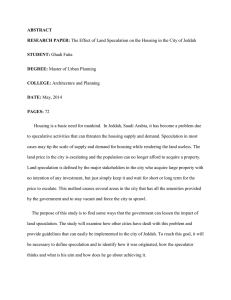Kyle Dickard
advertisement
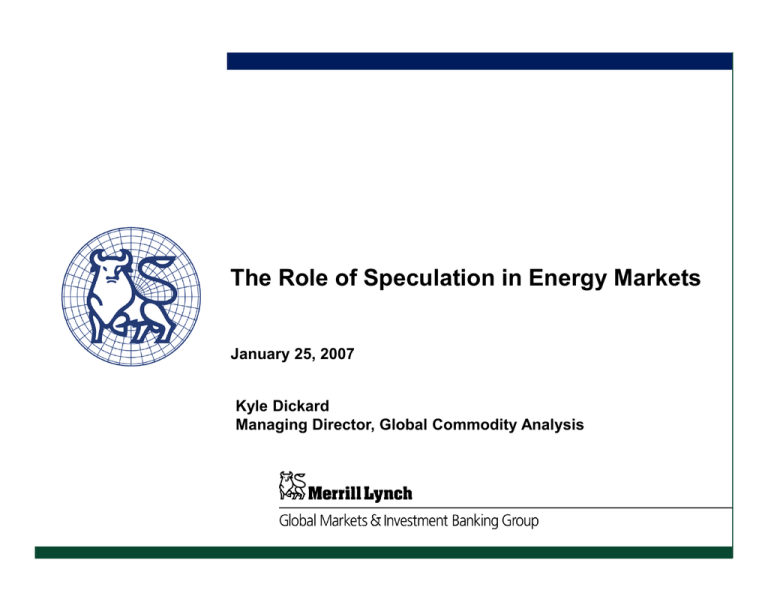
The Role of Speculation in Energy Markets January 25, 2007 Kyle Dickard Managing Director, Global Commodity Analysis Overview Quotes on Speculation Market Manipulation Defined Benefits of Speculation in the Energy Markets Hedgers, Speculators and Investors Speculation and Volatility Potential Impacts of Speculation on Price Other Drivers of Price Movements Market Responses to Price and Shape of the Curve Changes in Historical Relationships Conclusion 2 Quotes on Speculation “Overwhelmingly, academic research has shown that speculation actually reduces price volatility and that speculation increases availability of market information. Recent CFTC data supports the research by showing that physical commodity futures markets with higher non-commercial participation have lower overall volatility.” “Our bill would give regulators the information needed to expose oil traders engaging in market speculation or manipulation.” 3 Market Manipulation “Any planned operation, transaction, or practice that causes or maintains an artificial price. Specific types include corners and squeezes as well as unusually large purchases or sales of a commodity or security in a short period of time in order to distort prices and putting out false information in order to distort prices.” CFTC 4 Benefits of Speculation in the Energy Markets Counterparty for Hedgers Accept Risk Add Volume Provide Broad Market Information Create Liquidity Reduce Volatility 5 Hedgers, Speculators and Investors New Participants • Pension Funds • University Endowments • Hedge Fund Investors • Financial Institutions Commodities as an Asset Class 6 Speculation and Volatility Crude Oil Futures and Options Commercial and Non Commercial Positions 1995 - Current Contracts Volatility 1,400,000 0.75 Commercial Long Commercial Short Non-Commercial Long Non-Commercial Short Non-Commercial Spread Volatility 1,200,000 1,000,000 0.65 0.55 800,000 0.45 600,000 0.35 400,000 0.25 200,000 9/21/2006 3/21/2006 9/21/2005 3/21/2005 9/21/2004 3/21/2004 9/21/2003 3/21/2003 9/21/2002 3/21/2002 9/21/2001 3/21/2001 9/21/2000 3/21/2000 9/21/1999 3/21/1999 9/21/1998 3/21/1998 9/21/1997 3/21/1997 9/21/1996 3/21/1996 9/21/1995 0.15 3/21/1995 0 Sources: CFTC, NYMEX 7 Potential Impacts of Speculation on Price Estimated $100B from investors enters markets 40% allocated to crude oil Incremental demand of 1MM barrels per day Strong uptrend in prices 8 Potential Impacts of Speculation on Price NYMEX Crude Oil Prices and Total Open Interest Positions 1995 - Current Contracts $/Bbl 2,500,000 80 70 WTI Weekly Avg Price 2,000,000 60 50 1,500,000 40 1,000,000 30 20 500,000 10 WTI Open Interest - 0 Mar-06 Mar-05 Mar-04 Mar-03 Mar-02 Mar-01 Mar-00 Mar-99 Mar-98 Mar-97 Mar-96 Mar-95 Sources: CFTC, NYMEX 9 Other Drivers of Price Movements Lack of investment in energy infrastructure Asian and North American demand Lack of investment in exploration and production Limited potential for OPEC swing production Threat of disruption in producing regions Terrorism premium North American natural gas fundamentals 10 Market Responses to Price and Shape of the Curve Stimulate additional production of both natural gas and crude oil Increase in inventories Scale back of consumption Finance production and storage to meet future demand Oil Rigs and NYMEX WTI Price Natural Gas Rigs and NYMEX NatGas Price $/Bbl No. Rigs 500 450 Baker Hughes Oil Rig Count $/Bbl 16 No. Rigs 80 1,600 70 1,400 14 Baker Hughes Natural Gas Rig Count 400 60 1,200 12 300 50 1,000 10 250 40 800 8 200 30 600 6 20 400 350 Nymex WTI 150 4 100 Sources: Baker Hughes, NYMEX Jan-07 Jan-06 Jan-05 Jan-04 Jan-03 Jan-02 Jan-01 Jan-00 0 Jan-99 0 Jan-98 2 Jan-97 Jan-07 Jan-06 Jan-05 Jan-04 Jan-03 Jan-02 Jan-01 Jan-00 Jan-99 Jan-98 Jan-97 0 Jan-96 0 200 Jan-96 10 50 Nymex Natural Gas Sources: Baker Hughes, NYMEX 11 Changes in Historical Relationships Traditionally, there was an inverse relationship between crude oil price and inventory High inventories meant low prices and vice versa Recently, we have seen high inventories AND high prices Thousands of Barrels 410000 $/Barrel 80 70 WTI NYMEX Monthly Avg Price 390000 60 US Crude Oil Inventories 370000 Feb-06 Feb-05 Feb-04 Feb-03 Feb-02 Feb-01 250000 Feb-00 0 Feb-99 270000 Feb-98 10 Feb-97 290000 Feb-96 20 Feb-95 310000 Feb-94 30 Feb-93 330000 Feb-92 40 Feb-91 350000 Feb-90 50 Sources: NYMEX, DOE 12 Changes in Historical Relationships Relationship between crude oil inventory and price appears to have changed in 2004 Gulf War points illustrate price increase on PERCEPTION of future supply disruption $/Bbl Monthly 80 70 CL1 before 2004 CL1 2004+ 60 Gulf War 50 40 30 20 10 0 250000 270000 Sources: DOE, NYMEX 290000 310000 330000 350000 370000 390000 410000 Thousands of Barrels 13 Changes in Historical Relationships Relationship between crude oil inventory and shape of the curve remains relatively unchanged Strongest incentive to store when inventories are the highest and vice versa Thousands of Barrels $/Bbl 410000 2.5 390000 US Crude Oil Inventories 2 Month 2 - Month 1 1.5 370000 1 350000 0.5 330000 0 310000 -0.5 -1 290000 -1.5 Feb-06 Feb-05 Feb-04 Feb-03 Feb-02 Feb-01 Feb-00 Feb-99 Feb-98 Feb-97 Feb-96 Feb-95 Feb-94 Feb-93 -2.5 Feb-92 250000 Feb-91 -2 Feb-90 270000 Sources: NYMEX, DOE 14 Market Responses to Price and Shape of the Curve Global demand outpaces supply Spare refining capacity declines over time Global Spare Refining Capacity (Capacity – Refinery Runs) Thousands of Bbls 13000 12000 11000 10000 9000 8000 7000 pr -0 2 Ju l-0 O 2 ct -0 Ja 2 n03 A pr -0 3 Ju l-0 O 3 ct -0 Ja 3 n04 A pr -0 4 Ju l-0 O 4 ct -0 Ja 4 n05 A pr -0 5 Ju l-0 O 5 ct -0 Ja 5 n06 A pr -0 6 Ju l-0 O 6 ct -0 6 A Ja n- 02 6000 Source: MLCI Proprietary 15 Market Responses to Price and Shape of the Curve Contango shape of the forward curve Adequate supplies in the near term Supply concerns in the future $/Bbl WTI Curve as of 01/19/07 62 60 58 56 54 52 Fe b0 A 7 pr -0 Ju 7 nA 07 ug -0 O 7 ct -0 D 7 ec -0 Fe 7 b0 A 8 pr -0 Ju 8 nA 08 ug -0 O 8 ct -0 D 8 ec -0 Fe 8 b0 A 9 pr -0 Ju 9 nA 09 ug -0 O 9 ct -0 D 9 ec -0 9 50 Source: NYMEX 16 Conclusion Speculators are Necessary Meet the needs of hedgers Provide liquidity Reduce volatility Potential Causes of Price Movements Investors enter energy markets Lack of investment in energy infrastructure Crude Oil Futures and Options Commercial and Non Commercial Positions 1995 - Current Contracts 1,400,000 Volatility 0.75 Commercial Long Commercial Short Non-Commercial Long Non-Commercial Short Non-Commercial Spread Volatility 1,200,000 1,000,000 0.65 0.55 800,000 0.45 600,000 0.35 400,000 0.25 200,000 9/21/2006 3/21/2006 9/21/2005 3/21/2005 9/21/2004 3/21/2004 9/21/2003 3/21/2003 9/21/2002 3/21/2002 9/21/2001 3/21/2001 9/21/2000 3/21/2000 9/21/1999 3/21/1999 9/21/1998 3/21/1998 9/21/1997 3/21/1997 9/21/1996 3/21/1996 9/21/1995 0.15 3/21/1995 0 Sources: CFTC, NYMEX 17 Disclaimer Merrill Lynch prohibits (a) employees from, directly or indirectly, offering a favorable research rating or specific price target, or offering to change such rating or price target, as consideration or inducement for the receipt of business or for compensation, and (b) Research Analysts from being compensated for involvement in investment banking transactions except to the extent that such participation is intended to benefit investor clients. This proposal is confidential, for your private use only, and may not be shared with others (other than your advisors) without Merrill Lynch's written permission, except that you (and each of your employees, representatives or other agents) may disclose to any and all persons, without limitation of any kind, the tax treatment and tax structure of the proposal and all materials of any kind (including opinions or other tax analyses) that are provided to you relating to such tax treatment and tax structure. For purposes of the preceding sentence, tax refers to U.S. federal and state tax. This proposal is for discussion purposes only. Merrill Lynch is not an expert on, and does not render opinions regarding, legal, accounting, regulatory or tax matters. You should consult with your advisors concerning these matters before undertaking the proposed transaction. 18

